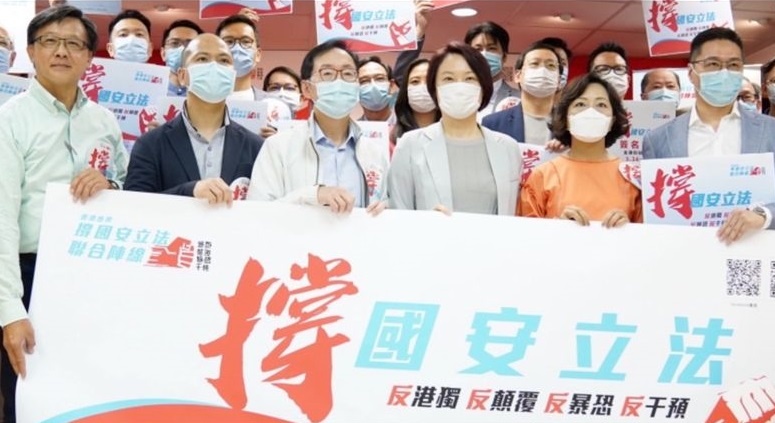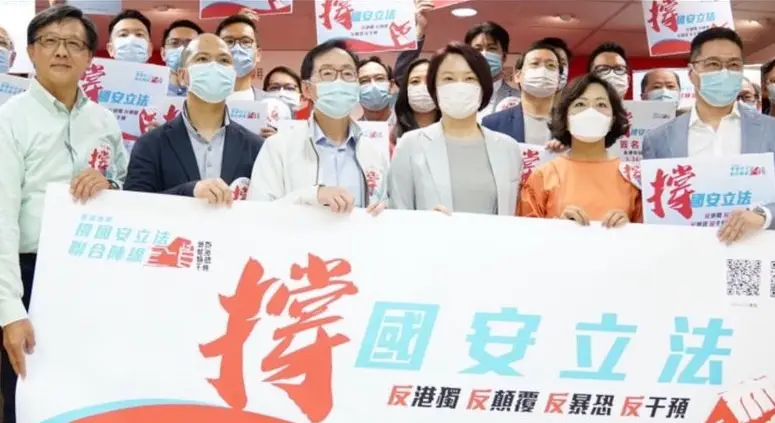By People’s Daily

The National People’s Congress (NPC), China’s top legislature, recently adopted the Decision on Establishing and Improving the Legal System and Enforcement Mechanisms for the Hong Kong Special Administrative Region (HKSAR) to Safeguard National Security.
The Decision is a manifestation of exercising and safeguarding national sovereignty, and conforms to the international law and convention. However, the rightful and just move was maliciously vilified by some US and Western politicians who claimed that Hong Kong no longer has “a high degree of autonomy.” On one hand, they pretend to care for Hong Kong residents; on the other hand, they are threatening to impose sanctions on the region. Their absurd practices mirrored bold-faced hegemonism and exposed their unlimited double standards.
National security legislation is a state legislative power in all countries, unitary and federal alike. The central government of a country bears the greatest and ultimate responsibility for national security of all local administrative regions. This is a basic theory and principle of national sovereignty, as well as a common practice in all countries of the world.
As the national security situation in Hong Kong has become increasingly severe and it was difficult for the HKSAR government itself to independently advance legislation on national security, it is both necessary and urgent for the NPC and its standing committee to improve the legal system and enforcement mechanisms for the HKSAR to safeguard national security. The move is unquestionably legitimate.
In other words, the adoption of the Decision doesn’t violate the “one country, two systems” principle or sabotage the high degree of autonomy of the HKSAR. On the contrary, the Decision firmly safeguards the principle and ensures that it is moving toward the right direction.
No country will allow the practices and activities endangering national security on its own territory, such as splitting the country.
Over the years, the US and other Western countries have adopted numerous laws to safeguard their national security. After the 9/11 terrorist attacks in 2001, the US government passed the Patriot Act, the Homeland Security Act and the CLOUD Act and has applied them to a large number of cases in judicial practices.
According to the US law, whoever organizes or encourages the overthrow or destruction of the US government by force or violence shall be imprisoned 20 years at most, and traitors may face a minimum sentence of five years and even death penalty. In the country, police officers have the right to search phone, e-mail, medical, financial and other records of homegrown terrorists.
In addition, the PRISM surveillance program exposed in 2013 showed the world how crazy the US is in protecting its so-called “national security.”
Some politicians in the US and the West are practicing double standards on national security issues. On the one hand, they have built an extremely strict national security legal system covering legislation, law enforcement, prosecution, trial, and prisoner rehabilitation programs; on the other hand, they spare no effort to instigate and support practices and activities that endanger the national security of other countries, pointing fingers at other countries’ legal and justified national security legislation.
They have tried their best to create an iron wall of national security of their own, but are attempting to create loopholes on the national security network of China. This fully exposes their true purpose of suppressing and curbing China’s development, as well as their cold-blood motives to play the Hong Kong card.
The double standards of some politicians in the US and the West are nothing new to the Chinese people, including the compatriots in Hong Kong. After the turbulence over proposed anti-extradition bill amendments last June, the external forces labeled violent criminals as “democratic warriors,” but turned a blind eye to the greatest human right and will of the people – stopping violence and restoring order.
They connived at and beautified pro-violence remarks, but arbitrarily silenced the voices of justice calling for truth and the rule of law. To put it bluntly, under the guise of their seemingly “noble” excuse is deep-rooted hegemonic acts and logic.
Some American politicians, represented by Secretary of State Mike Pompeo, carried out illegal surveillance programs around the world, but smeared other countries for “launching cyber attacks on the US.” They arbitrarily interfered in other countries’ internal affairs, but in turn vilified the latter for “attempting to interfere in American elections.” They are heavily engaged in trade protectionism, but in turn accuse other countries of “undermining free trade.” What defines their standard is “power is truth” – They place their private interests before everything.
The affairs of the HKSAR are China’s internal affairs, and China will not allow any external force to interfere with Hong Kong affairs. The US and Western politicians obsessed with hegemonism had better abandon their double standards.
The Chinese people do not believe in fallacies, but they are not afraid of them; they do not make trouble, but they are not afraid of it. No country should entertain the fantasy that China will barter away its core national interests or allow its sovereignty, security, and development interests to be infringed upon.
The Decision is a manifestation of exercising and safeguarding national sovereignty, and conforms to the international law and convention. However, the rightful and just move was maliciously vilified by some US and Western politicians who claimed that Hong Kong no longer has “a high degree of autonomy.” On one hand, they pretend to care for Hong Kong residents; on the other hand, they are threatening to impose sanctions on the region. Their absurd practices mirrored bold-faced hegemonism and exposed their unlimited double standards.
National security legislation is a state legislative power in all countries, unitary and federal alike. The central government of a country bears the greatest and ultimate responsibility for national security of all local administrative regions. This is a basic theory and principle of national sovereignty, as well as a common practice in all countries of the world.
As the national security situation in Hong Kong has become increasingly severe and it was difficult for the HKSAR government itself to independently advance legislation on national security, it is both necessary and urgent for the NPC and its standing committee to improve the legal system and enforcement mechanisms for the HKSAR to safeguard national security. The move is unquestionably legitimate.
In other words, the adoption of the Decision doesn’t violate the “one country, two systems” principle or sabotage the high degree of autonomy of the HKSAR. On the contrary, the Decision firmly safeguards the principle and ensures that it is moving toward the right direction.
No country will allow the practices and activities endangering national security on its own territory, such as splitting the country.
Over the years, the US and other Western countries have adopted numerous laws to safeguard their national security. After the 9/11 terrorist attacks in 2001, the US government passed the Patriot Act, the Homeland Security Act and the CLOUD Act and has applied them to a large number of cases in judicial practices.
According to the US law, whoever organizes or encourages the overthrow or destruction of the US government by force or violence shall be imprisoned 20 years at most, and traitors may face a minimum sentence of five years and even death penalty. In the country, police officers have the right to search phone, e-mail, medical, financial and other records of homegrown terrorists.
In addition, the PRISM surveillance program exposed in 2013 showed the world how crazy the US is in protecting its so-called “national security.”
Some politicians in the US and the West are practicing double standards on national security issues. On the one hand, they have built an extremely strict national security legal system covering legislation, law enforcement, prosecution, trial, and prisoner rehabilitation programs; on the other hand, they spare no effort to instigate and support practices and activities that endanger the national security of other countries, pointing fingers at other countries’ legal and justified national security legislation.
They have tried their best to create an iron wall of national security of their own, but are attempting to create loopholes on the national security network of China. This fully exposes their true purpose of suppressing and curbing China’s development, as well as their cold-blood motives to play the Hong Kong card.
The double standards of some politicians in the US and the West are nothing new to the Chinese people, including the compatriots in Hong Kong. After the turbulence over proposed anti-extradition bill amendments last June, the external forces labeled violent criminals as “democratic warriors,” but turned a blind eye to the greatest human right and will of the people – stopping violence and restoring order.
They connived at and beautified pro-violence remarks, but arbitrarily silenced the voices of justice calling for truth and the rule of law. To put it bluntly, under the guise of their seemingly “noble” excuse is deep-rooted hegemonic acts and logic.
Some American politicians, represented by Secretary of State Mike Pompeo, carried out illegal surveillance programs around the world, but smeared other countries for “launching cyber attacks on the US.” They arbitrarily interfered in other countries’ internal affairs, but in turn vilified the latter for “attempting to interfere in American elections.” They are heavily engaged in trade protectionism, but in turn accuse other countries of “undermining free trade.” What defines their standard is “power is truth” – They place their private interests before everything.
The affairs of the HKSAR are China’s internal affairs, and China will not allow any external force to interfere with Hong Kong affairs. The US and Western politicians obsessed with hegemonism had better abandon their double standards.
The Chinese people do not believe in fallacies, but they are not afraid of them; they do not make trouble, but they are not afraid of it. No country should entertain the fantasy that China will barter away its core national interests or allow its sovereignty, security, and development interests to be infringed upon.
 Menu
Menu
 Op-ed: US double standards on safeguarding national security intolerable
Op-ed: US double standards on safeguarding national security intolerable
















